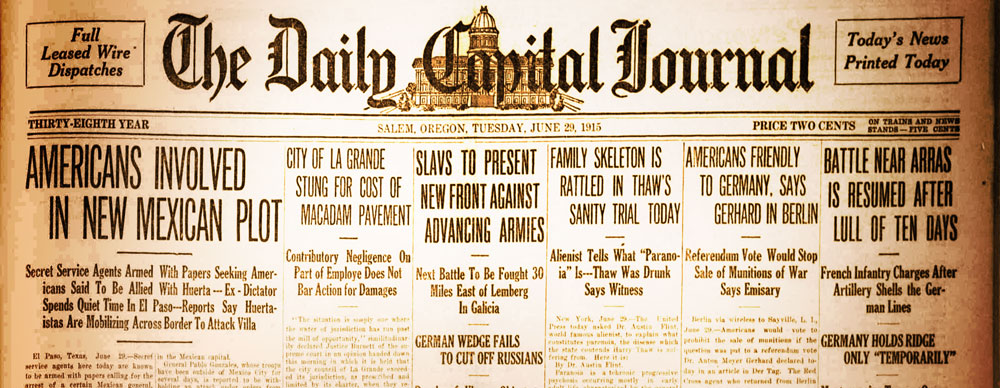June 29, 1915

by Richard van Pelt, WWI Correspondent
“Peace Will Come Only When Men Are Worn Out” read the headline in the Capital Journal. The article describes the futility (or the stubbornness) of pouring over a hundred thousand shells a day into one sector of the battlefield for going on six weeks:
The Germans are defending the front north of Arras which the French have been attacking for the past six weeks. It is estimated that an average of 100,000 shells have been fired daily near Arras. This begins to approach a record sent by the French artillery when 300,000 shells were fired in a single day.
The French have been making small gains. They have captured the famous labyrinth which embraces an entire square mile which makes it possible for the French infantry to attack the flanks of the German line.
The inability of the French to make further progress at Arras indicates that too much emphasis has been placed upon the effectiveness of concentrated fire. The English army officers have always insisted that battles are really won in workshops and that it is necessary to obtain ascendancy of the enemy’s artillery and that then the foe will be automatically exterminated. But if this is true it is difficult to explain why the French have been unable to progress at Arras.
It is estimated that the Austro-Germans are producing 250,000 shells daily. But there is no evidence that the Germans have duplicated the French record.
Elements other than gunfire play an important part in modern warfare. The magical effect of high-powered shells have not always measured up to the expectations and the results have been disappointing to the allies. Hope is now plead upon the effectiveness of the new ammunition which will soon be supplied the allies. If the results are satisfactory then it is inevitable that the allies will resume the offensive, otherwise compromise steps in the direction of peace will be taken.
Many thousands of lives would be saved if the militarists could agree on the lesson to be learned from the French in the battle north of Arras. Unless some compromise is reached, the deadlock must continue until both sides are exhausted and unable to fight any more. Peace then must be made under conditions practically as they exist today sofa as the military relations of the three major power are concerned.
In another headline, the special emissary for the German ambassador to the United States is quoted as saying Americans are friendly to Germany:
AMERICANS FRIENDLY TO GERMANY SAYS GERHARD IN BERLIN
Referendum Vote Would Stop Sale of Munitions of War Says Emissary
Americans would vote to prohibit the sale of munitions if the question was put to a referendum vote Dr. Anton Meyer Gerhard declared today in an article in Der Tag. The red cross agent who returned from Berlin from the United States as a special emissary for Ambassador Von Bernstorff said he was satisfied that American as a whole are friendly to Germany.
“On the other hand,” said Dr. Gerhard, “Americans condemn Germany for the violation of Belgium’s neutrality and the sinking of the Lusitania. They are unable to understand the German ideas on sinking of the Lusitania. They are unable to understand German ideas on these points, just as Germans are unable to understand why American should travel on munition carriers. Both people are laboring under entirely different ideas. Both have heretofore lived in peace and friendship and since no real occasion for antagonism exists they should continue to do so.
“One excellent effect of the war is the German Americans, without interfering with their loyalty to the United States, strongly remember the land of their birth. Besides them, there are wide circles of Americans who sympathize with Germany.
The paper reported that conditions were growing worse in Austria:
People of Vienna Object To Increasing Darker Shade of War Bread
Geneva, June 29. – Conditions at Vienna are rapidly growing worse, according to private advices received here today. The city is surrounded by a cordon of temporary structures for housing cholera victims.
The Viennese are said to be complaining that the Hungarians are now controlling the government. Hungary has forbidden the exportation of wheat into Austria. Budapest enjoys the luxury of white bread, while Vienna’s war bread is constantly growing darker in shade and more unpalatable.
In the Oregon Statesman, the editor supports the use of force to compel peace:
ARMED FORCE TO COMPEL PEACE
Of all the world peace plans that have had their inception in America, there is not that gives heater promise of ultimate success than that put forward by the new League of Peace which was born the other day in Independence hall in Philadelphia.
The league differs from most peace bodies in that it recognizes humanity as it is today, and doesn’t try to graft a Utopian scheme on a sinful and warlike race. In aiming at the pacification of the world it recognizes that in the present imperfect state of civilization the only dependable basis of right conduct is force.
We need not hesitate to admit this truth. All government, as yet, is supported by armed force. The city has its policemen to preserve order among citizens. The state has its sheriffs and militia. The federal government has its marshals, and bak of all these law enforcers of limited power stands the United States army ready to put down insurrection and uphold the decisions of the supreme court and the laws of congress.
The proposal now is simply to extend this method to international relations. The nations are to band together, like the citizens of a community or the constituent states of a federated government, agreeing not merely to keep the peace among themselves, but to use their armies and navies to compel any troublesome member to keep the peace.







Leave A Comment